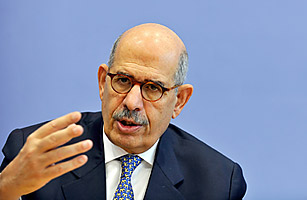
Egyptian activists, most of them young, were out in force in the midday sun on Friday, Feb. 19, their flags and posters raised high, their chants rippling across the pavement at the arrival terminal of Cairo International Airport. They had come out in a startling show of support for a candidate who has yet to declare his candidacy for the presidency of Egypt.
Indeed, Mohamed ElBaradei, who until recently held the top position at the International Atomic Energy Agency , hasn’t yet decided to run in Egypt’s upcoming presidential election. But a campaign on his behalf has started anyway. And on Friday, hundreds of Egyptians — rallied by Facebook and opposition newspapers — filled the street in front of the airport’s arrival hall, awaiting the Egyptian diplomat’s first return to his home country since his retirement from the IAEA last year, and chanted, “We will not accept inheritance. Raise your voice — ElBaradei will be President.”
But if ElBaradei runs, this may be the first election in which the opposition groups can present a viable alternative candidate. ElBaradei has broad appeal as a well-established and respected public figure whose career flourished far from the bounds of corrupt regime politics. “We are not just liberal people coming here,” said Baha’ Ahmed, a pharmacist standing in the crowd with his elderly mother. “People from all over are coming. Not only liberals, but people from all over Egypt, as ElBaradei is very independent politically.”
Indeed, the roars of the crowd oscillated throughout the afternoon between chants for ElBaradei and condemnations of Mubarak. Some admitted that their support for the returning diplomat was rooted entirely in their opposition to the current President. “We love Egypt, but we hate the government. Believe me, all Egyptians hate Hosni Mubarak,” said Ayman Helman, a clothing-store manager who was draped in an Egyptian flag. Behind him, a crowd chanted, “Egypt has 1,000 alternatives. And ElBaradei is the evidence … Hey ElBaradei, there’s no going back.”
In a country where political demonstrations require official permission and signs of popular unrest are regularly greeted with swarms of riot police, the ElBaradei reception was remarkable. Crowds gathered, chanted, called for an end to Mubarak and even entered the airport. And there were no riot shields in sight. “Mohamed ElBaradei is an international figure,” says Samer Shehata, an assistant professor of Arab politics at Georgetown University. “Although I wouldn’t put it past the regime, it would be a media blunder to greet him with scores of riot police trying to block supporters from showing their appreciation and welcoming him back to Egypt.”